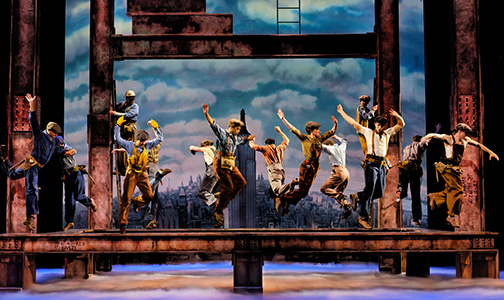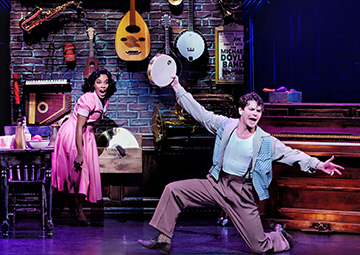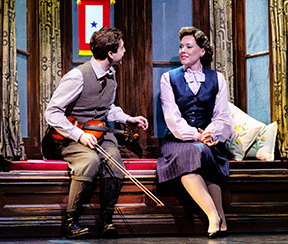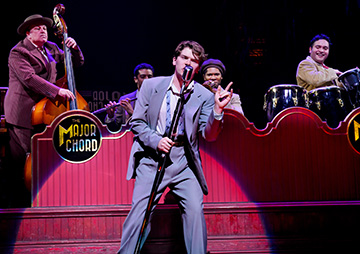By Lucy Komisar
The opening is a rooftop that reminds one of an Edward Hopper painting. It’s New York post-war 1946. People are jitterbugging. Perched on fire escapes of tenements. There is a jazzy feel. A stunning number, a showstopper in a show that is full of them, features a dozen construction workers on a dizzying high girder in Hoboken with a view of the Hudson River and Manhattan skyline tap dancing along and around it. I don’t recall a dance number like it!
Tommy Caggiano (a street-wise Clyde Alves) gives his buddy Jimmy Doyle (Colton Ryan) some advice on dealing with women: “Peaches and wine.” A little sweet, a little acidic. Rather like the story.
Jimmy is a charmer. He’s a singer who can’t hold a gig for his drinking. He falls for Francine Evans (Ann Uzele) a black singer (called “Negro” in those days), and when she raises the race problem, he declares, “This isn’t Texas.” Ryan has a warm pleasing baritone. Uzele has a terrific show-tune soprano and presence; she takes over the stage.
Well, New York City in the 40s was not so far from the South in racial ideology. Which gets us to the story. It doesn’t match the choreography. Or the music and lyrics by John Kander and Fred Ebb, among the finest creators in the genre’s history. Lin-Manuel Miranda gets credit for added lyrics. Susan Stroman who made the dances and directed is dazzling. Alas, book writers David Thompson and Sharon Washington not so much.
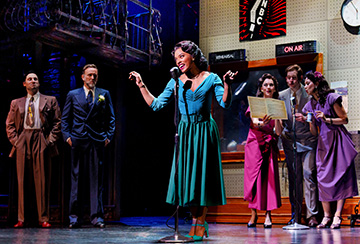
The problem is trying to squeeze 21st-century sensibilities into a 1940s framework. Jimmy and Francine get married (so fast you could blink at the courtship), but that seems to create no problems except his jealousy at her success on NBC radio. Only problem is a projected tour that can’t occur, because then she’d appear live. Venues won’t take her. Trumpet player Jesse Webb (John Clay III) fought in the army but can get only a kitchen job, because he is black.
So, race could have been a story line, but it’s thrown in and then ignored almost as another piece of scenery.
The real war problem for the majority of all races at the time — the deaths of their husbands, brothers, sons, fathers – is indicated by Jimmy, whose psyche was upended by the death of his brother, and Madame Veltri (the fine, here emotionally-hardened Emily Skinner), a violin teacher waiting for the son who doesn’t come home and withholding connection to a brilliant violin student (Oliver Prose), the obvious stand-in. But that is not a major theme.
Just to hit all the bases, Mateo Diaz (a very fey Angel Sigala) is Cuban and gay, though he appears to get problems from his sexuality only from his abusive father, a Cuban baseball fan, which seems to be the only thing, besides music, we are supposed to know about Cubans.
So, instead of the book being written first and the composer and lyricist crafting songs to fit it, it happened the other way around, cobbling bits of a story together.
Everybody’s problem is solved when a friend of Jimmy’s lets him manage an uptown club, and he brings in the jobless musicians – Jesse the horn player, Mateo on bongos — to make a Latin jazz band. Francine will sing there. Great moment when the band rises on a music barge out of the orchestra pit. The problem that doesn’t solve is the lack of a credible story-line.
“New York, New York” Book by David Thompson and Sharon Washington. Music and lyrics by John Kander and Fred Ebb. Directed and choreographed by Susan Stroman. St. James Theatre, 246 West 44th St., NYC. 888-985-9421. Runtime 2:35. Opened April 26, 2023. Open run. Review on NY Theatre Wire.


